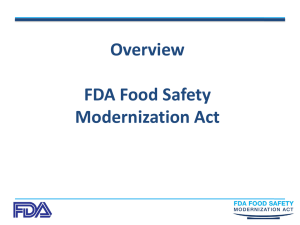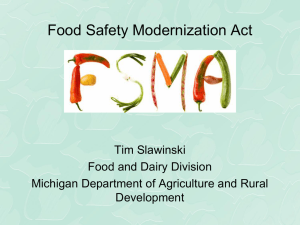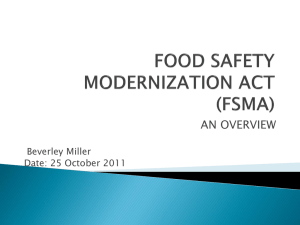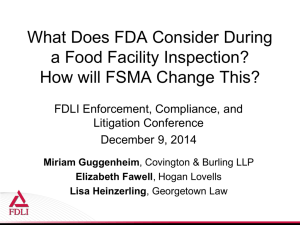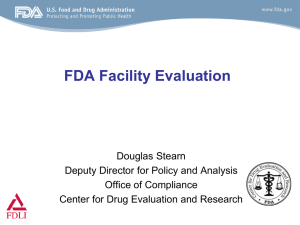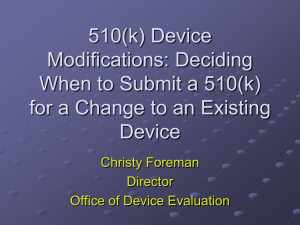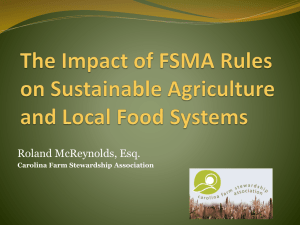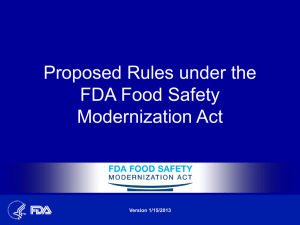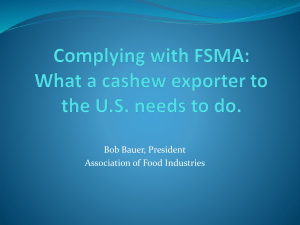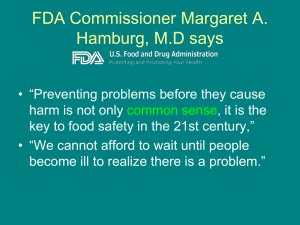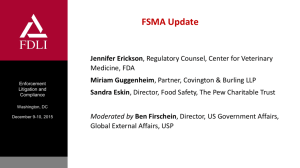Food Safety Modernization Act
advertisement
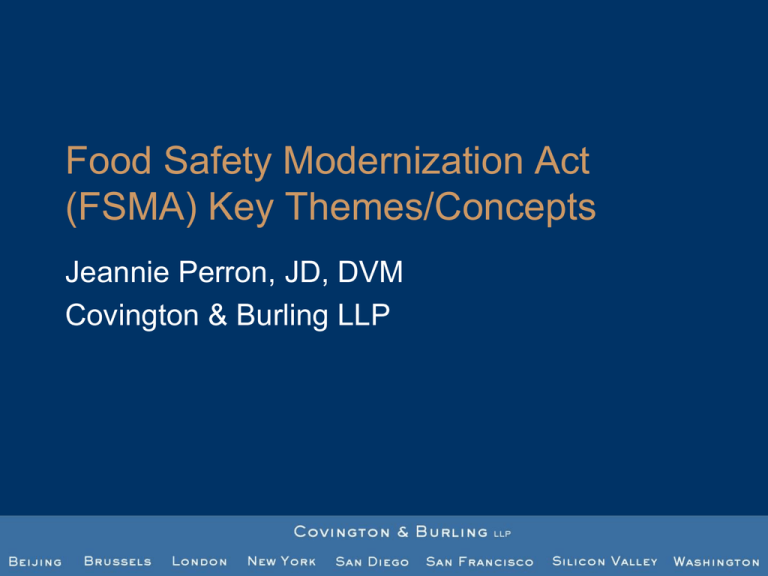
Food Safety Modernization Act (FSMA) Key Themes/Concepts Jeannie Perron, JD, DVM Covington & Burling LLP Food Safety Modernization Act (FSMA) Key Themes/Concepts • Focus on prevention, not inspection/ testing • Risk-based approach 2 Food Safety Modernization Act (FSMA) Key Themes/Concepts • Supply chain traceability/ transparency – Know your supplier, particularly for imports 3 Food Safety Modernization Act (FSMA) Key Themes/Concepts • Enable food safety crises rapid response, containment • Enhance FDA’s inspection/ enforcement authority 4 Hazard Analysis • Must identify/evaluate known or reasonably foreseeable hazards: – biological, chemical, physical, radiological hazards; natural toxins; pesticide and drug residues; unapproved food/color additives; allergens – hazards naturally occurring or intentionally introduced 5 Hazard Analysis • Reanalyze every 3 years or whenever a significant change is made affecting risk 6 Preventive Controls • Identify and implement preventive controls – to significantly minimize or prevent identified hazards and – so undeclared allergens will not adulterate or misbrand food 7 Preventive Controls • Must monitor and verify that preventive controls are effective, and take corrective action when needed – Verification activities include environmental and product testing programs – Must keep records of these activities for 2 years, including test results 8 Preventive Controls • Preventive controls are: – Risk-based procedures, practices, and processes – That a knowledgeable person would employ – Consistent with current scientific understanding of safe food manufacturing/ handling 9 Preventive Controls • Examples include: – Sanitation procedures and practices – Process pathogen controls – Allergen control program – Recall plan – Current good manufacturing practices (cGMPs) – Verification procedures for suppliers and incoming ingredients 10 Preventive Controls – FDA Regulatory Implementation • Hazard analysis/preventive controls requirements effective July 2012 – Statute says FDA must promulgate regulations by then that – establish science-based minimum standards for: • analyzing and documenting hazards • implementing and documenting preventive controls – work for all sizes and types of facilities 11 Preventive Controls – FDA Regulatory Implementation • FDA may exempt from hazard analysis/preventive control requirements facilities solely engaged in the storage of packaged foods that are not exposed to the environment 12 Traceability • By Jan. 2013, FDA must require additional recordkeeping for “high risk” foods 13 Foreign Supplier Verification Program • U.S. importers must have a program by January 2013 to verify that imported food is produced in accordance with U.S. requirements 14 Foreign Supplier Verification Program • FDA must promulgate guidance and regulations within 1 year, and may require: – – – – monitoring records for shipments lot-by-lot certification of compliance annual on-site inspections checking the hazard analysis and preventative controls of the foreign supplier, and – periodically testing and sampling shipments 15 Expanded FDA Records Access • FDA records access authority expanded to foods FDA believes “likely to be affected in a similar manner” • FDA will have access to all newly-required records (including test results) 16 Facility Registration Changes • Biennial registration • No registration fee – Bill does contain fees for reinspection and reimbursement of FDA’s recall-related expenses 17 Facility Registration Changes • Suspension of registration – If FDA determines that a food manufactured, processed, received, or held by a registered facility has a reasonable probability of causing serious adverse health consequences or death, may suspend – If suspended, food from facility may not be introduced into commerce 18 FDA Inspection/Enforcement • Increased inspection schedule – Hi-risk facilities • Once during first 5 years after enactment • Every 3 years thereafter – Other facilities • Once during first 7 years after enactment • Every 5 years thereafter 19 FDA Inspection/Enforcement • FDA mandatory recall authority for Class I recalls • Relaxed standards for administrative – detention – “reason to believe” food is adulterated or misbranded 20

